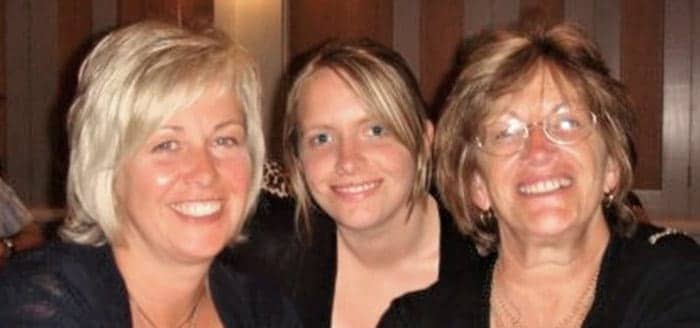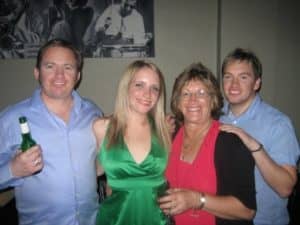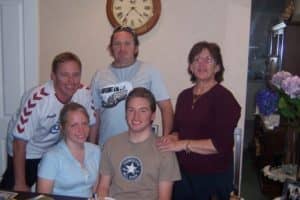A Daughter’s Fight to Save Her Mother from Mesothelioma

Sharon Jones lives in Auckland, New Zealand, and works at a family-owned seed company that sells corn and grass seed locally and exports around the world. The youngest of four children – and the only girl – Sharon is the daughter of English parents who emigrated to New Zealand in the 1970s with Sharon’s two oldest brothers (who are twins).
“All of our extended family are still there [in England], so they had to build a whole new life here in New Zealand,” Sharon recently told the Mesothelioma + Asbestos Awareness Center. “Their friends quickly became family.”
For a number of years, the Jones family lived happily in Auckland. Then, tragedy struck. “In 1990 we lost my Dad,” Sharon remembered, “this would have been really tough on Mum, especially not having family being right on the doorstep, but she is incredibly strong and made it through that tough time.”
The loss of Sharon’s father was hard on the family, but Sharon, her mom, and her brothers managed to continue thriving in New Zealand over the next twenty years – until suddenly another devastating turn took place.
Diagnosed with Mesothelioma
Sharon’s mom, Brenda, learned she had cancer on Friday, April 29, 2011. “Mum found out she had cancer before she was meant to,” Sharon recalled that frightful day. “For the last eight months she had recurrent fluid on her lungs after originally having pneumonia the year before. She was going through tests and she had an appointment booked to see the specialist to get the results on the Monday, but she happened to go to her family doctor on the Friday before, and they told her that they had found cancer.”
As often happens with cancer diagnosis, the news was a surprise to the Joneses. “I remember that Friday and the following Monday vividly,” Sharon said. “I remember the shock at finding out there was no way to cure this, and the devastation that my Mum may not be here in 18 months.”
Sharon and her family were never told what type of cancer her mother had, only that it was a type of lung cancer. (The most common form of mesothelioma affects the linings of the lungs.) They spent the weekend googling to learn more about the options available to them and what treatments her mother might have to undergo. However, the word “mesothelioma” never came up.
It wasn’t until that Monday that the family learned about the devastating disease. “Mum has been through so much, she’s already beaten breast cancer once before, so this just felt completely unfair. I felt completely unprepared and powerless – I still do, that feeling hasn’t left. I desperately want to wake up and this be a bad dream.”
Maintaining Hope
 “I remember her trying to cheer us up on the car ride home on that Monday,” Sharon told MAA Center.
“I remember her trying to cheer us up on the car ride home on that Monday,” Sharon told MAA Center.
“Over time you can hear and see the impact this disease has had on her lungs: She can’t walk very far anymore. She went from someone who walked every morning and went shopping three times a week, to someone that now struggles to get around without someone being there for support.
“She still has her humour though – she is always the cheeriest person at all of her oncology appointments, she often jokes with the doctors and makes requests for a new body from Santa.”
Although the cancer started out as pleural mesothelioma in 2011, it has now spread to the peritoneum, a lining around the abdominal cavity. Although the prognosis for the disease is much poorer after spreading begins, Sharon’s mom has not given up yet.
“She still has hope,” Sharon declared. “She wants more time.”
Paying for Treatment
Although New Zealand has a publicly funded health care system, it does not cover all treatment options. Some emerging treatments like Keytruda are approved only to treat late-stage melanoma that cannot be removed surgically. For Brenda, this means limited options are available.
“Since the disease has metastasized, we need to shrink the tumours to provide relief from the symptoms which are worsening,” Sharon explained. “Mum has already had the first-line chemotherapy, which stabilized the disease overall, so the doctors are recommending gemcitabine – but this offers only a 10% chance of shrinking the tumours. Keytruda was mentioned by the public oncologist, but due to the financial implications was mostly passed over.”
All of these concerns have put Sharon and her brothers in a situation that no child ever wants to be in. Sharon wants to share her mother’s hope, but it is sometimes hard to do so. “The reality of Mum’s decline in health and what the not too distant future meant for her sent me into a bit of a spin,” she said. “The reality is that she has never given up on any of us kids and I refuse to not try anything and everything to give her the best treatment option available to her, which the doctors agree is Keytruda.”
With their focus squarely on the promise of Keytruda – a relatively new immunotherapy drug that has helped many mesothelioma patients who otherwise had no hope of survival – the Jones siblings are determined to raise the money necessary to obtain the treatment their mother needs.
“My brothers and I met and discussed our options,” Sharon explained, “and we needed enough to cover the first four treatments, plus a safety net for all the additional costs that we could incur as a result of her having private treatment. The four treatments alone cost just under $34,000 [New Zealand dollars].”
Together, they set up a page on the crowdfunding site Givealittle, where people can donate, publicly or anonymously, to help Brenda Jones get the care she needs. “We have been blown away by the response to date,” Sharon stated. “It’s amazing to see how many people care about her and us and want to support her.”
The Effects of Secondary Asbestos Exposure
 While there is still hope of Brenda receiving the Keytruda treatments that could mean a turn for the better in her treatment, there is still the question of how she developed the disease.
While there is still hope of Brenda receiving the Keytruda treatments that could mean a turn for the better in her treatment, there is still the question of how she developed the disease.
Before her mother was diagnosed, Sharon was completely unaware of the debilitating effects of this terrible disease. “I had never heard of mesothelioma,” she acknowledged. “I knew that asbestos was really bad for you, but I never realized the irreversible effects it has on your body.”
As it turns out, the asbestos exposure that led to Brenda’s mesothelioma goes all the way back to her husband – Sharon’s father – who passed away in 1990.
“We believe that Mum was exposed to this whilst washing my Dad’s work overalls during the late 1960s in England,” Sharon said. “My dad worked in a factory that had asbestos pipe lagging. Mum had to wash the overalls by hand as they didn’t have a washing machine. Mum would have inhaled those fibres during the washing process.”
The reason it took so long for the disease to develop and be detected is that it has a very long latency period. In many cases, it takes decades before signs and symptoms even begin to appear. Once they do begin to show up, the symptoms can often mimic those of other diseases, which often leads to misdiagnosis and a delay in discovering the true nature of the cancer.
Nonetheless, once people are faced with the reality of the disease, they often understand the relationship right away. “Understanding the disease is the easy part,” Sharon declared. “It’s coming to terms with the prognosis and treatment options that opens the can of worms.”
Now that she knows more about it, Sharon is focusing her efforts in a more streamlined way. “I spent a lot of time on the websites of American Medical Colleges and Institutes looking at what they did to treat the disease, support networks, and advocates,” she explained. “There is a huge amount of information, but after the news of Mum’s progression, the most useful information I have gained is in relation to the treatment options and clinical trials she could qualify for with her disease.”
In addition to learning more about the disease, Sharon hopes to be more active in getting new treatments approved for those who have already undergone unsuccessful therapies. “In the New Year, I would like to work towards getting my government to fund Keytruda for mesothelioma and other lung cancers,” Sharon said. “It’s hard to accept in any context that the best treatment for a disease cannot be given because of money.”